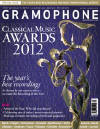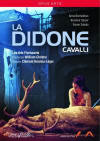Texte paru dans: / Appeared in:
*

GRAMOPHONE - Awards Issue 2012
Pour s'abonner /
Subscription information
Opus Arte
OA1080D

0809478010807 (ID248)

Reviewer: Richard Lawrence
Cavalli’s Trojan tale under Christie in Caen
La Didone is the third of Cavalli’s 27 surviving operas. It was premiered in 1641 at the Teatro San Cassiano, the first opera house to open in Venice and the first anywhere to admit the general public. The librettist was Busenello, with whom Cavalli had collaborated on his previous opera and who was to provide the libretto of L‘incoronazione di Poppea for Monteverdi.
Most of the human characters will be familiar from Les Troyens, but the plot takes a surprising turn at the end: Dido, abandoned by Aeneas, falls into the arms of Iarbas, a neighbouring king whom she had earlier decisively rejected. Berlioz would not have approved.
The action moves from the death of Coroebus in Troy to the denouement in Carthage. On the way there are, as in Poppea, interventions by the gods and comic scenes for the mortals. The dramatic pacing is effective, helped by this variety, although the absence of a love duet for Dido and Aeneas is regrettable: urged on by Mercury, Aeneas prepares to depart with indecent haste.
This production makes a good case for what The New Grove Dictionary of Opera calls ‘a rather uneven work’. The sets are simple — a wall with an arch stands for Carthage, the gods are framed by scaffolding — and the costumes are plain dresses, tunics, trousers. With a small orchestra of solo strings, continuo and a couple of woodwind, the focus is very much on the declamatory skills of the singers. Anna Bonitatibus is outstanding, especially in her confrontation, impassioned but dignified, with Aeneas. Krešimir Špicer looks no more heroic than he did in II ritorno d’Ulisse in patria (Virgin Classics, 6/04) but he is touching in Aeneas’s farewell aria. Back in Troy, Cassandra mourns Coroebus over a chromatic bass that descends, and descends further. Beautiful , and beautifully done by Katherine Watson. The doubling and trebling of parts may be found confusing; and, as in a recent CD recording (Dynamic, 5/1 1), the translation mistakes Calicut for Calcutta. Fine supporting cast , especially Maria Streijffert as Hecuba and Xavier Sabata as Iarbas; elegant, well-paced conducting from William Christie.
Cliquez l'un ou l'autre
bouton pour découvrir bien d'autres critiques de CD
Click either button for many other reviews


